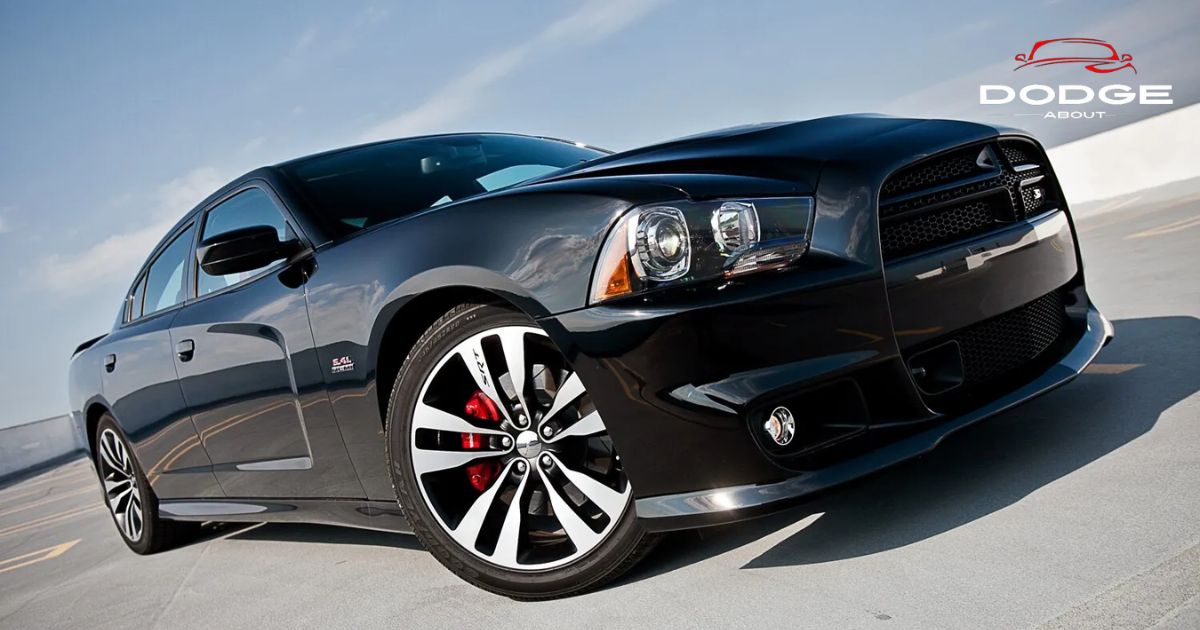Dodge Charger overheating means the engine gets too hot. This happens when there’s not enough coolant or if parts like the radiator or thermostat are not working right. It can also be due to problems with the water pump, fan or leaks. Fixing these issues is important to keep the car running well and avoid damage.
When the temperature goes up, it is a problem. We need to figure out why. Let’s look under the hood. Maybe something is not working right. Delving into the mysteries under the hood becomes most important as you seek answers to the question echoing in your mind, why is my Dodge Charger overheating? We want to keep your Charger cool and running smoothly, like it should.
If your Dodge Charger is overheating, it could be due to issues such as low coolant levels, coolant leaks, a faulty thermostat, radiator problems, cooling fan malfunctions, water pump failure, belt issues, low engine oil, or excessive stress on the engine. Checking these components and addressing any problems can help resolve the Dodge Charger overheating issue.
Dodge Charger Overheating Reasons

If your Dodge Charger is running hot, it could be due to the following reasons:
- Low Coolant Level
- Coolant Leaks
- Faulty Thermostat
- Radiator Problems
- Cooling Fan Malfunctions
- Water Pump Failure
- Belt Issues
- Low Engine Oil
- Excessive Stress on the engine
We will discuss each of these mechanical parts. In this article, we will discuss the warning signs of each. No matter that what engine in your Dodge Charger. It is a warning sign something is wrong if it is running hot. We will answer other FAQ’s about the Dodge Charger, so continue reading for more information!
Low Coolant Level
Low Coolant Level warning in a Dodge Charger typically indicates that the coolant level in the radiator or coolant reservoir is below the recommended level. Coolant is an important component in the Dodge Charger cooling system, responsible for maintaining the engine temperature within the optimal range.
Open the hood and locate the coolant reservoir. Ensure that the coolant level is between the minimum and maximum marks. If it’s low, add the recommended coolant to bring it to the proper level. The Low Coolant Level warning is often triggered by a sensor that measures the coolant level. A damaged sensor could give a false reading, so it’s advisable to have the sensor and related components checked.
Coolant Leak
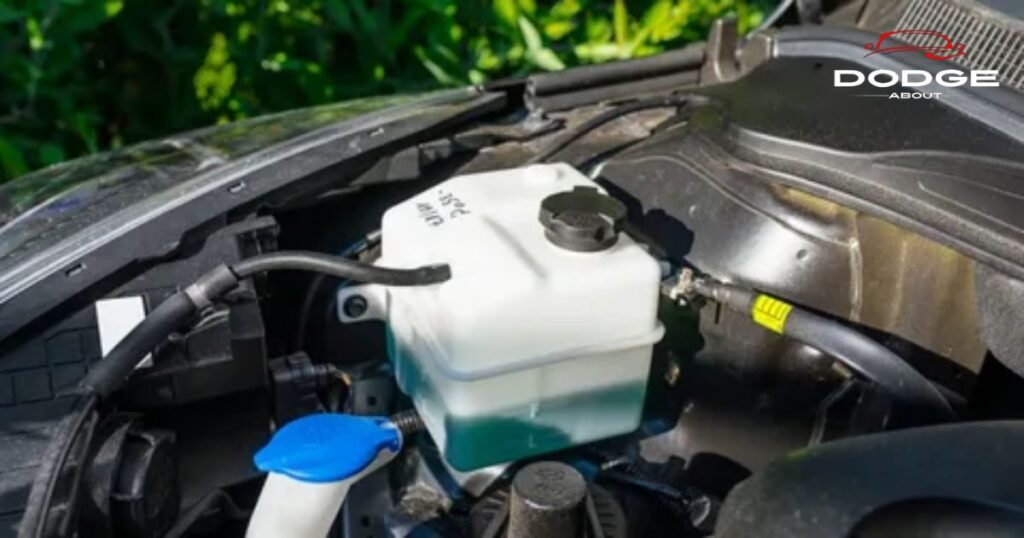
Coolant leak in a Dodge Charger means that the liquid that keeps the engine cool is escaping from where it’s supposed to stay. This liquid, called coolant, is really important because it stops the engine from getting too hot. Sometimes, the leak happens because parts like the radiator or hoses get damaged. You might notice a wet spot under the car, a sweet smell, the engine getting too hot, or the coolant level going down.
It is important to fix a coolant leak quickly to avoid hurting the engine and make sure the Dodge Charger keeps running well. If you think there’s a coolant leak, it’s best to ask a professional to check and fix it so your Dodge Charger stays safe.
Faulty Thermostat
Faulty thermostat in a Dodge Charger can cause problems with how the engine stays cool. The thermostat helps control the flow of coolant, which keeps the engine at the right temperature. When the thermostat doesn’t work correctly, it can get stuck and cause issues.
If it’s stuck open, the engine might take too long to warm up, using more fuel and causing pollution. If it’s stuck closed, the engine can get too hot and be damaged. Signs of a bad thermostat include weird temperature readings, lower fuel efficiency, or the engine getting too hot. It’s important to fix a faulty thermostat quickly to avoid engine problems.
Radiator Problem
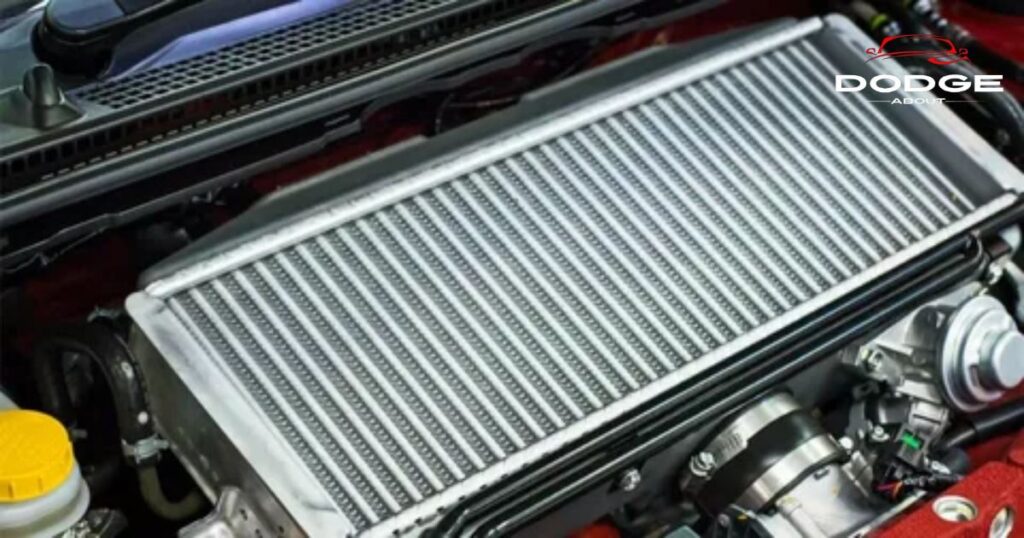
The radiator is important in Dodge Charger because it helps keep the engine cool. Some common problems include leaks, clogs and the engine getting too hot. Leaks can happen from damaged hoses, a rusty radiator or a faulty cap. Clogs can be caused by dirt or things blocking the coolant flow. If the engine gets too hot, it can be because of a broken thermostat, a bad water pump or not enough coolant.
To avoid problems, it is important to regularly check the coolant, look for damage in hoses and the radiator and clean the cooling system.
Cooling Fan Malfunction
Cooling Fan Malfunction in a Dodge Charger means that the fan, which helps keep the car’s engine cool, is not working properly. The fan’s job is to cool down the engine by getting rid of the heat it produces. If the fan is not working right, it can make the engine too hot, and that’s bad because it might damage the engine or make the car not work well.
Common reasons for this problem include issues with the fan’s motor, problems with the blades or trouble with the electrical parts or sensors. It’s really important to fix cooling fan problems quickly. Else the engine might get damaged and that can be expensive to fix.
If you notice the engine getting too hot or hear strange sounds, it’s a good idea to have a professional check it out to fix the fan problem and keep the car running smoothly.
Water Pump Failure
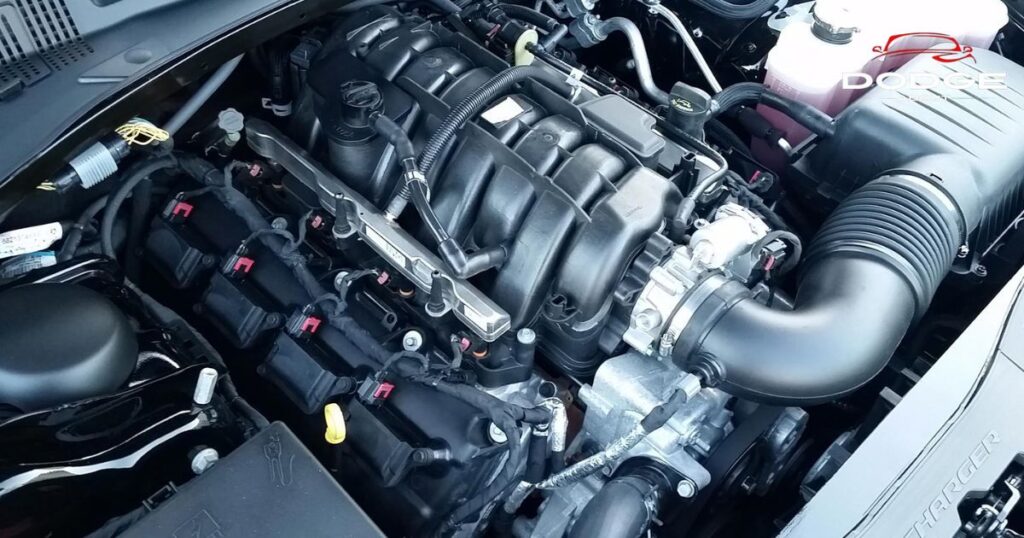
When the water pump in a Dodge Charger stops working correctly, it can cause a Dodge Charger overheating problems. The water pump is like the engine’s cooling system manager. Its job is to circulate a liquid called coolant through the engine to keep it from getting too hot.
If the water pump fails, the engine can get too hot, leading to issues like Dodge Charger overheating. Signs that the water pump might be failing include the engine getting too hot, leaks of coolant, and strange noises coming from the front of the engine. It’s important to fix water pump problems quickly to avoid damaging the engine.
Belt Issues
The Dodge Charger a cool American muscle car, sometimes faces problems with its belts that can affect how it works. One common issue involves the serpentine belt, which helps run important engine parts like the alternator and power steering.
As time passes, this belt can wear out or get damaged causing problems. The tensioner which keeps the belt in the right position, can also have Dodge Charger overheating issues. Signs that something’s wrong include strange noises, less power steering help, and problems with the charging system.
Low Engine Oil
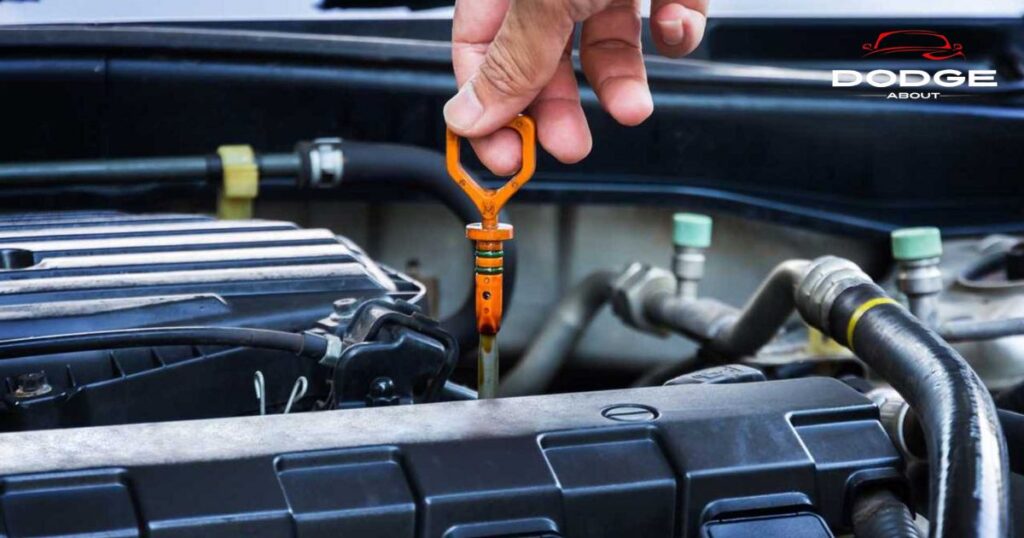
If Dodge Charger overheating, this can be because you have very little oil in the engine. Having not enough oil in your Dodge Charger is not good. The oil is like a drink for the engine, making sure everything moves smoothly and doesn’t get too hot. If there’s not enough oil, the engine can get hurt. It might not work as well, use more fuel and sometimes, it can even break.
If the engine oil runs out, the engine parts may break from the inside. So, it’s important to check the oil regularly and add more if it’s low. This helps keep your Dodge Charger running well and avoids big problems later.
Excessive Stress on the Engine
Putting too much pressure on the engine can cause Dodge Charger overheating issues. Dodge Charger has a strong engine, but if you drive really fast a lot, accelerate aggressively, or tow heavy things, it can make the engine work too hard. This can lead to the engine getting too hot, which is not good.
It might also wear out important engine parts faster, like the pistons and valves. To avoid Dodge Charger overheating issues, it’s important to follow the recommendations for servicing the Dodge Charger. Not push the engine too much and make sure to take good care of the car with regular maintenance.
How do I stop my Dodge Charger Overheating?
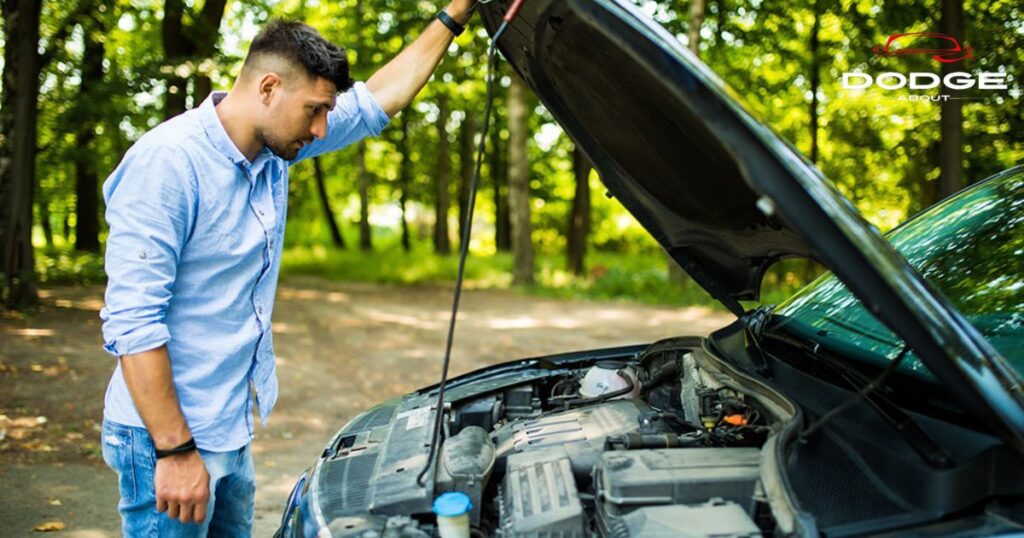
Here is a simple table with tips on how to prevent your Dodge Charger overheating:
| Issue | Solution |
| Coolant Levels | Regularly check and maintain proper coolant levels. Ensure the coolant mixture is appropriate for your vehicle. |
| Cooling System Leeks | Inspect the entire cooling system for leaks, corrosion, or damage. Address any identified issues promptly. |
| Thermostat Health | Monitor the thermostat for proper functioning. Replace a faulty thermostat to ensure it regulates the engine temperature correctly. |
| Radiator Maintenance | Keep the radiator clean from debris, dirt, and bugs. Periodically flush the cooling system to remove any accumulated contaminants. |
| Water Pump Condition | Check the water pump for wear and tear. Replace a failing water pump to maintain efficient coolant circulation throughout the engine. |
| Engine Oil Levels | Ensure the engine has enough oil levels. Adhere to the recommended oil change schedule to keep the engine lubricated properly. |
Remember, if you consistently experience Dodge Charger overheating issues, it’s crucial to seek professional helps to identify and address any underlying problems with the cooling system.
Frequently Asked Questions
How do you know if your radiator is bad on a Dodge Charger?
If your Dodge Charger overheats or you see coolant leaks, your radiator might be bad. Look for visible damage or rust on the radiator for confirmation.
How do I check my engine cooling system?
To check your car’s cooling system when the engine is cool, look at the coolant level in the tank or radiator. Check for leaks, inspect hoses and belts, and make sure the fan works when the engine is warm.
Can I use water instead of coolant?
In an emergency, you can use water to cool your engine for a short time. But it’s not good for the engine in the long run. Coolant has special stuff that keeps your engine safe and working well.
What causes a Dodge to overheat?
A Dodge can overheat if it doesn’t have enough coolant or if there are leaks in the cooling system. Problems with the thermostat, radiator, or water pump can also cause Dodge Charger overheating.
Final Thoughts
If your Dodge Charger is getting too hot, it’s a big problem. First, check the coolant (the liquid that cools the engine). If it’s low, your car can overheat. Look for leaks, which could be anywhere in the cooling system. The radiator and fan which help cool the engine, need to work properly.
If the thermostat (a part that regulates temperature) is broken, your car might get too hot. A bad water pump can also cause Dodge Charger overheating. Make sure you change the coolant regularly to keep everything working well. If your car has other problems, like not running smoothly, fix them quickly to avoid more issues. If the Dodge Charger overheating continues, it’s best to get a professional mechanic to find and fix the problem. So your Dodge Charger stays healthy.

